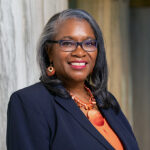I often say that the liberal arts prepare students for the jobs of tomorrow—jobs that may not even exist when they begin their studies. The recent, dramatic rise of technology and artificial intelligence is adding new urgency to the age-old question in higher education: How do we prepare students for jobs and careers when our society is changing so quickly? Which tasks and decisions in the future will be automated and delegated to computers, and which will remain within human hands?
Employers are thinking about this, too, and we’re hearing from them that the lessons imparted by a liberal arts education—critical and nuanced thinking, intercultural competence, and innovation, among others—remain fundamental to success in today’s environment. These skills may prove to be even more vital in the future.
This is a good time to clearly define a liberal arts education. The liberal in “liberal arts” has nothing to do with politics. It’s also not limited to the arts, humanities, and social sciences—the STEM disciplines like astro-physics, biology, biochemistry, and mathematics are in fact liberal arts disciplines.
At the College of Liberal Arts & Sciences at the University of Illinois Urbana-Champaign, our undergraduates choose from 70 majors, from astronomy, chemistry, plant biology, and statistics to English, history, philosophy, communication, economics, and psychology. Each student emerges with skills and perspectives for their chosen field, but by design they’ve also attained a comprehensive education with important insights into disciplines dramatically different from their own major. Statistics majors have pondered modern literature, Spanish majors have considered different economic theories, political science majors have spent time studying black holes, and so on. Through their broad experiences, instruction, and preparation, liberal arts students graduate with a sophisticated ability to make complex decisions in times of change.
This runs contrary to some ways of thinking. After all, doesn’t a class in colonial history cut into a future microbiologist’s laboratory time? Yes, but this approach is also helping that microbiologist develop a rich and varied outlook so that they can be fully informed, responsible decision-makers in their workplaces, homes, and communities. What better place than college to prepare your mind for a fully engaged future?
Indications are that a liberal arts education translates well to success. In March, LinkedIn released its “Skills on the Rise” report, which listed the fastest growing job skills in the U.S., based on member data. Near the very top of the list were skills such as conflict mitigation, adaptability, innovative thinking, public speaking, customer engagement and support, and risk assessment—all skills that can be cultivated by a liberal arts education.
Liberal arts graduates are adaptable: Strada Education Foundation reported that 70% of liberal arts graduates change careers from their first to their second job, compared to 53% for IT majors and 54% for allied health majors. “Liberal arts graduates hit their stride later in their careers,” Strada reported, “experiencing rapid wage growth in their late 30s and early 40s—the fastest among majors.”
These findings are no surprise to liberal arts institutions, but we need to do an even better job of preparing our students. In 2021, the American Association of Colleges and Universities, in partnership with Hanover College, published “How College Contributes to Workforce Success: Employer Views on What Matters Most,” which showed that employers acknowledge the value of a college degree for achieving workforce success, but they perceive a gap between the necessary skills and the readiness of recent graduates. This is why we must continue to ensure more students have the opportunity to engage in high impact practices such as internships, capstone projects or theses, faculty-led research projects, and community-based or service-learning projects which allow students to draw connections between their course work and the real world.
There is great opportunity here. We are entering an age of some very big questions, and people are asking, “What will endure?” I’m certain that our future lies in creativity, common sense, empathy, ethics, nuanced thinking and so many other distinctly human abilities that liberal arts graduates have been learning for a very long time.
